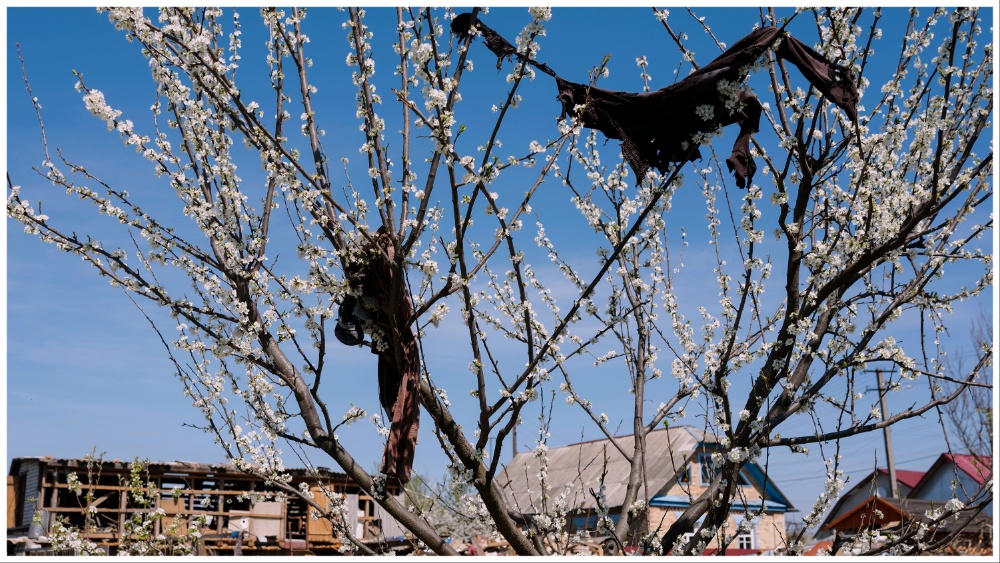
Last year, during an online panel at Hot Docs film festival featuring Ukrainian documentary filmmakers who were staying in place, Oksana Karpovych told attendees how she’d gained knowledge working alongside foreign media crews covering the war, and was now applying that to her own creative documentary projects.
This year, at the festival’s 30th anniversary edition, Karpovych attended the in-person Forum market event to pitch “Intercepted” — her observational doc exploring the aftermath of the Russian invasion of Ukraine in 2022 — which ended up winning the 2023 CMF-Hot Docs Canadian Pitch Prize.
With Ukraine in the spotlight at Hot Docs this year, both audiences and industry attendees are getting wide exposure to the films and ideas of leading Ukrainian documentary creators. The timing of this programming is perfect, said Hot Docs programmer Myrocia Watamaniuk, not only for the obvious reason.
“Ukrainian documentary cinema has grown in lockstep with the documentary community around the world,” said Watamaniuk, pointing out that Hot Docs and Ukraine are around the same age. “What started as a trickle of Ukrainian names — every once in a while, a feature or co-production — has turned into a steady river of submissions of incredible films.”
“Eurodonbas”
“The fact that this is happening during the second year of the war is a sad historical coincidence,” she added. “So many artists are working so hard, and this is the most challenging time for them, as well as the most significant time for all of us Ukrainians in the country and abroad.”
The centerpiece program Made in Ukraine includes five short films — four made through Docudays UA’s Civil Pitch 2.0 production competition — as well as five recent features: AP journo Mystlav Chernov’s “20 Days in Mariupol,” winner of the Sundance Audience Award for World Cinema Documentary; Roman Liubyi’s Sundance-premiering investigation of Russia’s 2014 downing of Malaysian Airlines Flight 17 over Eastern Ukraine, “Iron Butterflies,” which is also building awards buzz on the circuit; Kornii Hrytsiuk’s historical corrective “Eurodonbas,” which examines the region’s true roots; Alisa Kovalenko’s “We Will Not Fade Away,” about Donbas teens who join an adventure mission to the Himalayas; and Mila Teshaieva’s and Marcus Lenz’s “When Spring Came to Bucha,” which respectfully follows a community’s grieving and rebuilding after Russian troops withdraw from a small town near Kyiv in Spring 2022.
At the Made in Ukraine conference panel, moderator Anna Palenchuk — who is also the producer of “Eurodonbas” — asked the filmmakers about the origin, process and intentions of their recent films.
“I actually entered Bucha with the Ukrainian military,” said Teshaieva of “Bucha.” “What I saw was a vast landscape of death. I came with a camera and microphone and started filming because I felt it was my duty as a witness.
“None of us would expect to see what we saw in those first days in Bucha,” she continued. “This had enormous historical significance. So I’ve been meeting people and following from the first days, this process of Bucha coming back to life. I would say we struggled in a way, there was no planning, no thinking about aesthetics or how the dramaturgical line would unfold.
“It was it was really built on the flow of our intuition.”
Liubyi’s film is creatively constructed from historical footage and other sources, inviting viewers to form their own opinions about the tragedy. “Justice is a complex concept,” he said, when asked about his prescient film, which was made before the war started. “In the case when there is a mass murder of 298 people from different continents and no one is punished — well, you can’t make these people who shot the plane accountable because they hide in Russia.
“Now we are avoiding pathetic words like ’our camera is our weapon’; that is in the past,” he continues. “So the fact that this film exists and is telling what happened there, it’s like, zero point, zero, zero zero, one percent of justice.”
Before closing the formal discussion, Palenchuk — a doc-producing dynamo who recently relocated to Toronto with her family and has spearheaded a professional networking group for Ukrainian film community in Canada — asked the panel filmmakers about current projects.
Teshaieva is continuing to film people she encountered in Bucha. “Look, we became really close with every person who became a part of our movie, and we’re keeping in close contact with many of them,” she said. “We need to show people in Germany and other countries these stories. It’s revealing how society is changing, and how people are finding or not finding their place in society.”
Liubyi typically works with archive and editing and avoids making films that require establishing connections with characters, he said. “Surprisingly, I’m working on a cartoon for kids and grown-ups, but the main audience is Ukrainian kids around 10 to 12.
“I do have some frontline stories, but I also think it’s also vital to create cartoons for kids during a war,” he added.
The Doc Shop — Hot Docs’ market platform for documentaries seeking sales, acquisitions, and festival opportunities — offers 2023 industry delegates access to most 2023 festival selections from April 27 to May 31, via the SwapCard platform.












